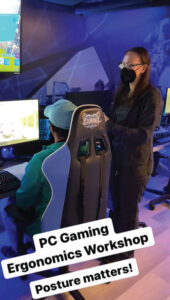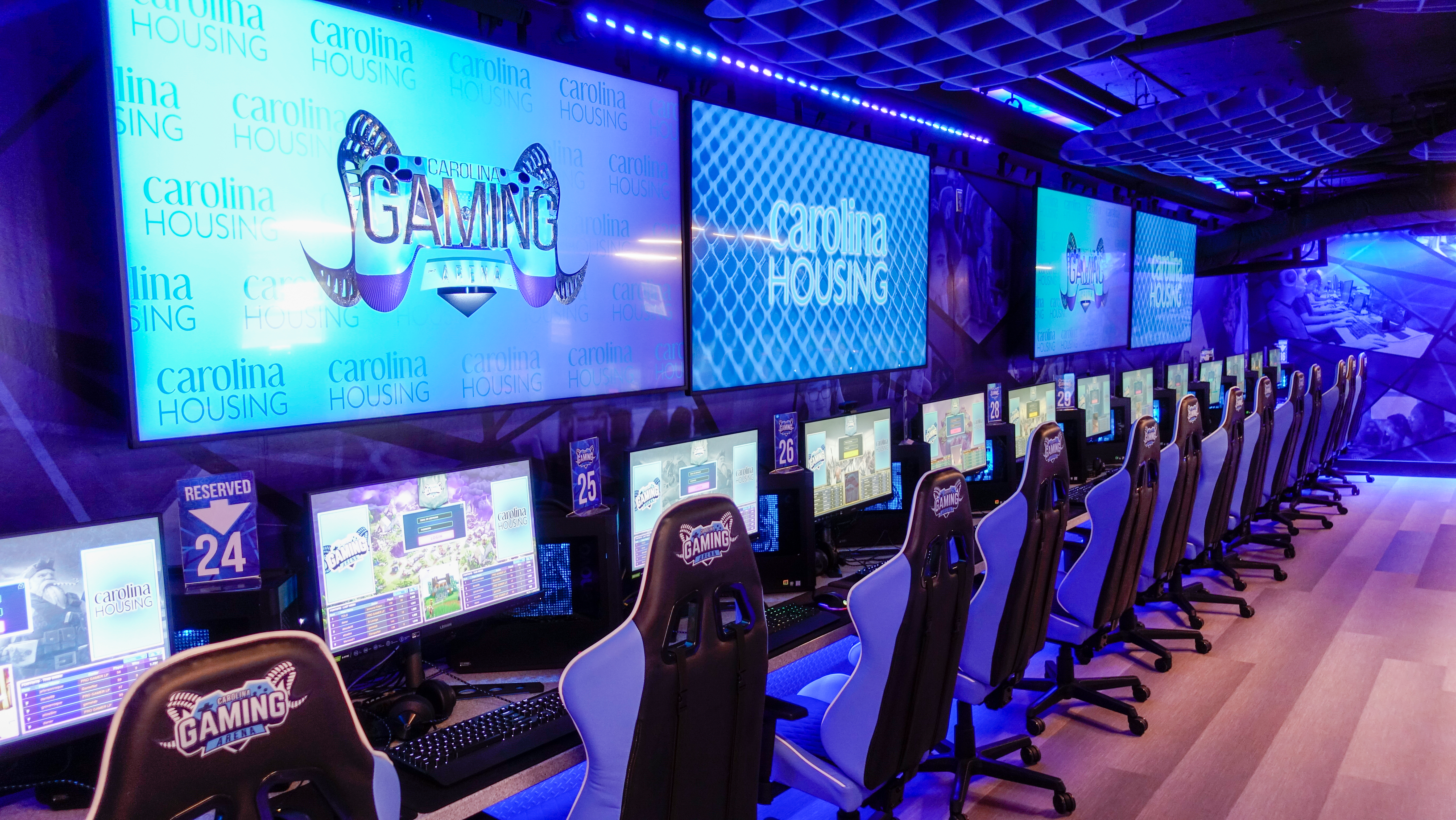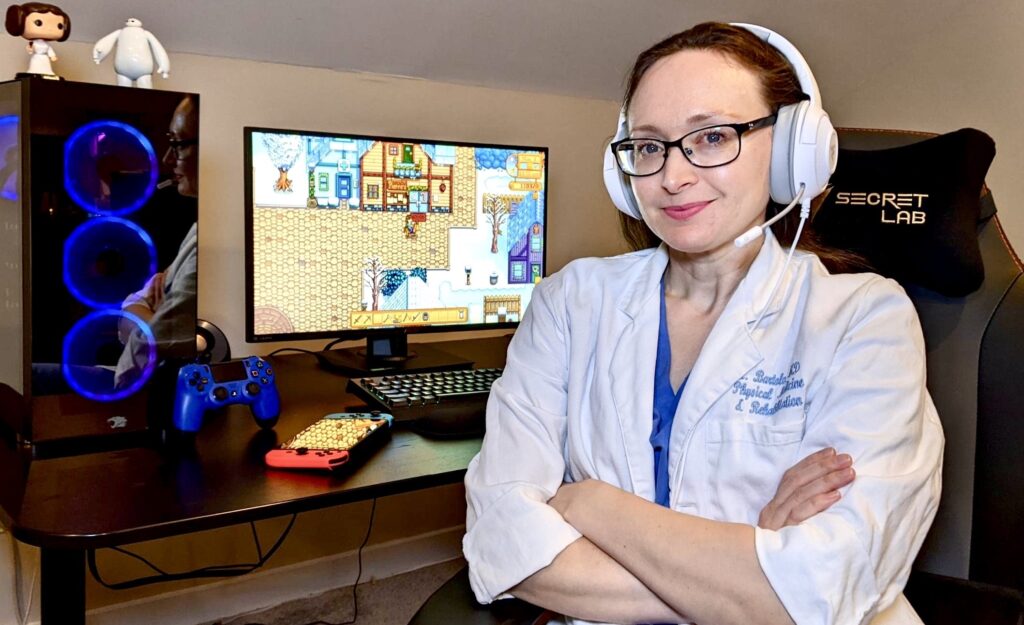For Dr. Katie Bartolo, when it comes to esports and gaming health – It’s Game On!
Dr. Kathryne Bartolo, MD is UNC Physical Medicine and Rehabilitation’s (PM&R) newest sports medicine physician. She provides spine and musculoskeletal diagnosis care at the UNC Spine Center and at the UNC Center for Rehabilitation Care (CRC). Dr. Bartolo completed her residency at Rutgers New Jersey Medical School/Kessler Institute for Rehabilitation (2020), and specializes in sports medicine, diagnostic musculoskeletal ultrasound, and esports and gaming health.
Esports, an abbreviation for electronic sports, refers to organized, competitive video gaming. For Dr. Bartolo, esports and gaming health is not just a medical field, it is also a passion. She has played video games since the age of five, with a first-generation Game Boy. Soon after, she was introduced to the Sega Genesis games, Sonic the Hedgehog and Ecco the Dolphin, and she was hooked.
Dr. Bartolo loves how video games overcome the barrier of physical distance. Players can connect and build community across the globe.
At the beginning of the COVID-19 pandemic, she rediscovered the game, World of Warcraft (WoW). She was living in the New York-New Jersey area at that time, where businesses had shut down and people were isolating in their homes. Despite this, she and friends were still able to meet up regularly in the digital reality of WoW to enjoy fictional holiday celebrations, raid dungeons together, and simply explore virtual worlds, while chatting on Discord (an online audio software) the entire time.
Dr. Bartolo was motivated to focus on esports health as a medical doctor when she started noticing that players within their gaming community were having setbacks from injuries caused from repetitive movements (mouse and keyboard clicks), sustained aberrant posture (curved back and forward head position), and prolonged screentime. Recently, Thomas “ZooMaa” Paparatto, a professional esports player, had to retire at the age of 25 due to wrist and thumb injuries.
 Dr. Bartolo observed one professional player forced to sit out a match due to health reasons. She discovered that a top Twitch streamer (video-streaming platform that offers way to watch people play games) struggled to keep up with their posted schedule due to a gaming-related arm injury. Several gamer friends reached out for advice about how to help their lower back pain. These instances helped Dr. Bartolo realize there is a need for specialized healthcare professionals in the gaming area, particularly those with detailed knowledge of the musculoskeletal and nervous systems, which are most often affected, as well as experience working with athletes and the challenges they face.
Dr. Bartolo observed one professional player forced to sit out a match due to health reasons. She discovered that a top Twitch streamer (video-streaming platform that offers way to watch people play games) struggled to keep up with their posted schedule due to a gaming-related arm injury. Several gamer friends reached out for advice about how to help their lower back pain. These instances helped Dr. Bartolo realize there is a need for specialized healthcare professionals in the gaming area, particularly those with detailed knowledge of the musculoskeletal and nervous systems, which are most often affected, as well as experience working with athletes and the challenges they face.
While there’s currently not much formal training in esports health, Dr. Bartolo had the opportunity to complete a Sports Medicine fellowship at New York Presbyterian Hospital, where she worked with high-level professional and Division I collegiate athletes and spent time honing musculoskeletal ultrasound techniques. Ultrasound is useful in diagnosing tears in muscles and tendons, nerve damage, ligament sprains, and inflammation near joints.
Esports players are a new generation of athletes, and Dr. Bartolo has found that her board-certification in sports medicine, together with her love for video games, has created a great foundation for developing the area of esports health. Dr Bartolo has given several presentations on esports health.
Dr. Bartolo hopes to promote a positive relationship between the healthcare community in esports, so that players will be more likely to seek help when they need it and provide medical professionals with the resources to feel comfortable treating these athletes. She also hopes to improve the overall health and performance of esports players by expanding education on best practice in and out of gaming, as well as through the development of evidence-based guidelines for maximizing esports performance informed by the results of original clinical research studies.
Dr. Bartolo see esports patients at the UNC Imaging & Spine Center and the Center for Rehabilitation Care (CRC). She uses ultrasound imaging (use of high-frequency sound waves to view inside the body) which can often diagnose the problem without the need of an MRI imaging. The CRC will soon have “gaming battle station” simulators on-site that gamers and esports players can use for injury assessments, rehabilitation, and performance evaluations.
Many of Bartolo’s esport patients have musculoskeletal injuries (MSK), lower back and neck pain, and shoulder, wrist, and hand pain. These can be the result of sitting in one place in the same position for a long time. She stresses the importance of assessing one’s ergonomic setup, encouraging aerobic exercise, improving core strength, taking regular breaks to move around, and resting eyes to reduce strain.
Dr. Bartolo is looking forward expanding the research and development of esport health. She recently partnered with UNC professor, Dr. Adam Kiefer, PhD, Department of Exercise and Sport Science, and Matthew Belskie, UNC Instructional Technology Consultant, on the development of the UNC Esports Health & Performance Initiative (EHPI). She also joined the new peer-reviewed publication, Journal of Electronic Gaming & Esports (JEGE), as an editorial board member. Bartolo recognizes the need for publishing high-quality research, specifically randomized-controlled trials, to help inform evidence-based guidelines for the medical care of esports players. JEGE will help fill the gaps in the esports literature, especially with regards to esports health.

Esports is quickly growing into a competitive outlet for college students. Many schools, including UNC, have incorporated esports into student life. The Carolina Esports Club offers a campus gaming room with 36 PC stations, game consoles, a 16-foot video wall, and over 90 games. UNC also has an Esports Program, to which Dr. Bartolo is a physician advisor, where a collective group of teams compete and represent UNC in the National Association of Collegiate Esports – NACE StarLeague. NACE has over 170 member schools, with over 5000 students participating in tournaments. NACE has given over $16 million in scholarships and aid.
 Dr. Bartolo continues to host the UNC Esports Health & Wellness Workshop Series to help boost gamers performance and educate gamers on preventing injuries with warm up exercises, ergonomic setup, HIIT aerobic exercises, and emphasizing posture and the benefit of core strength.
Dr. Bartolo continues to host the UNC Esports Health & Wellness Workshop Series to help boost gamers performance and educate gamers on preventing injuries with warm up exercises, ergonomic setup, HIIT aerobic exercises, and emphasizing posture and the benefit of core strength.
The Triangle is a natural location to build a center for esports health given the strong presence of the technology community in this region. These days, she can usually be found playing Stardew Valley on her home gaming PC that she built. Understanding the importance of hydration for both physical and cognitive performance, she is hardly ever found without a water bottle by her side. Dr. Bartolo’s home exercise program includes many exercises that emphasize the strengthening of core muscles (like the McGill Big 3 and forward plank) and upper back muscles (low rows and the shoulder alphabet – “I’s, Y’s and T’s”)
The Spine Center is located at 1350 Raleigh Road in Chapel Hill. For appointments, please call the UNC Hospitals Spine Center at (984) 974-4200. The Center for Rehabilitation Care is located at 1807 Fordham Blvd in Chapel Hill. For appointments, please call 984-974-9747.

